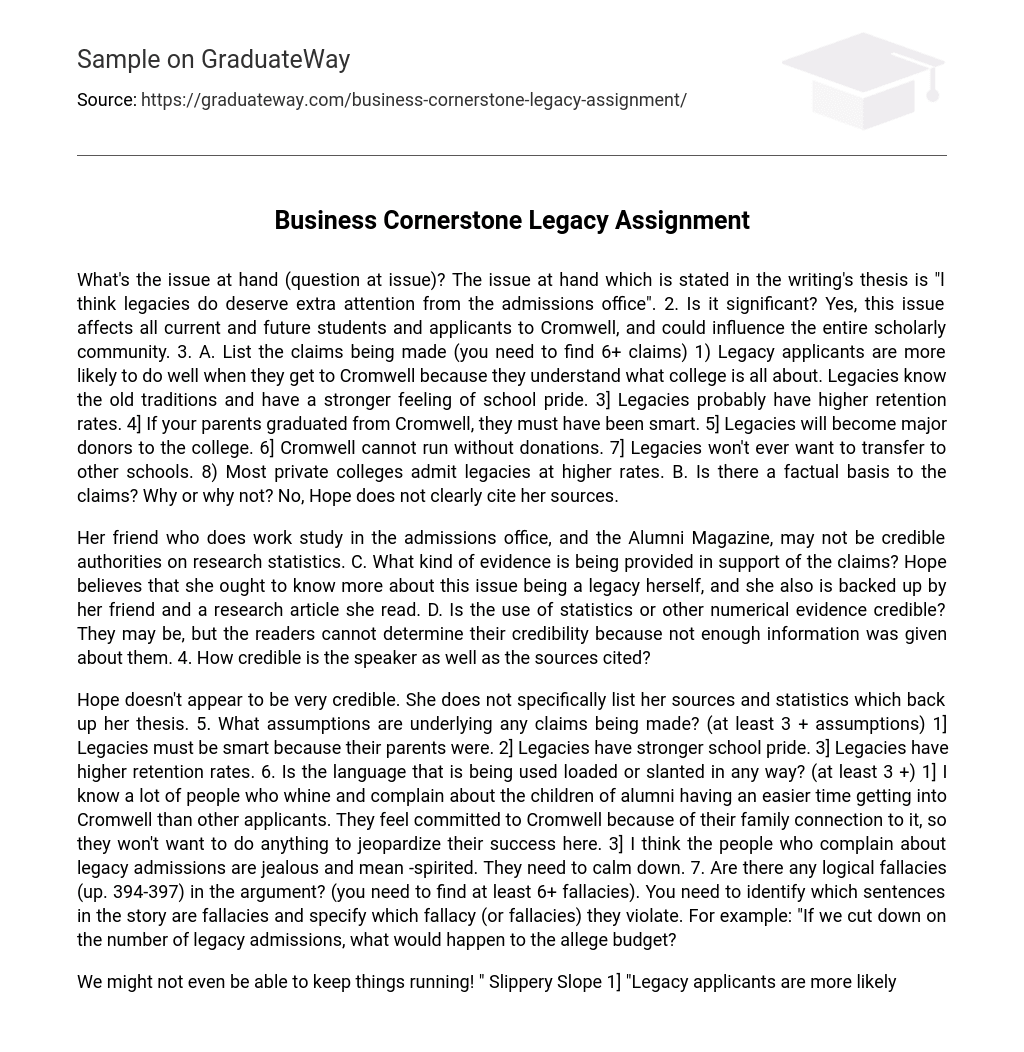The main issue addressed in the thesis is whether legacies deserve extra attention from the admissions office. This issue has significant consequences as it affects current and future students and applicants to Cromwell, potentially impacting the entire scholarly community. Several claims are made in the text:
1) Legacy applicants are more likely to succeed at Cromwell due to their understanding of college life and familiarity with old traditions, which enhances their school pride.
2) Legacies probably have higher retention rates.
3) The fact that a student’s parents graduated from Cromwell suggests their intelligence.
4) Legacies are likely to become major donors to the college, which is essential for Cromwell’s functioning.
5) Legacies are unlikely to transfer to other schools.
6) Many private colleges have higher admission rates for legacies.
However, there is no clear factual basis provided for these claims as Hope does not cite her sources.
Her friend, who works in both the admissions office and the Alumni Magazine, may not be a reliable source of research statistics. However, Hope, being a legacy herself, believes that she should have more knowledge on the issue. Additionally, she is supported by her friend’s insights and a research article she read. It is unclear whether the use of statistics or other numerical evidence is credible, as not enough information was provided about them. The credibility of the speaker and the sources cited is uncertain.
Hope’s credibility is questionable as she does not provide specific sources or statistics to support her thesis. The assumptions underlying her claims are that legacies must be intelligent because of their parents, they have stronger school pride, and they have higher retention rates. The language used in the text is loaded and slanted, with statements about people whining and complaining about legacies getting special treatment. The author also suggests that those who criticize legacy admissions are jealous and mean-spirited. There are several logical fallacies in the argument, but six or more must be identified. For example, the statement questioning the impact of cutting down on legacy admissions on the alleged budget is an example of a fallacy.
We might not even be able to maintain functionality. Slippery Slope 1] “Legacy applicants are more likely to succeed at Cromwell because of their understanding of college life.” – Circular Reasoning Hope is essentially stating that legacies deserve preferential treatment because they understand the college environment more, and they understand it more simply because they are legacies. 2] “They likely have higher retention rates because legacies are likely not to transfer to other schools.” – Non-Sequitur There is no logical connection between the two ideas that legacies have higher retention rates and they won’t desire transfers.
Despite a high retention rate, some students may still desire to transfer. Although the children of alumni that Hope knows are generally intelligent, this cannot be applied to all Cromwell students. The limited number of students known by Hope makes it challenging to judge the intelligence of the entire student body. Furthermore, it is important to note that legacies are not the sole group receiving preferential treatment in admissions. Just because other groups receive special consideration does not warrant admitting more groups. While private colleges often admit alumni children at higher rates, this does not justify Cromwell following suit. The inquiry remains: what would occur with the college budget if legacy admissions were reduced?
Hope uses emotive language and appeals to fear when she states, “We might not even be able to keep things running!” She wants us to believe that if legacies are admitted at the same rate as other students, the school might be shut down. However, this is just a scare tactic.
The presentation also lacks credible proof with citations as the most important omission. Hope could have provided more information about how legacies contribute to school life or are held to higher standards, and are expected to offer more than non-legacy applicants.





